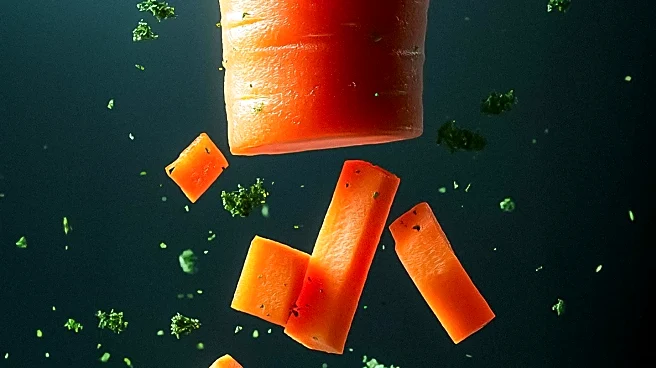What's Happening?
A recent study published in the journal Environmental Research has discovered nanoplastics in the edible parts of vegetables for the first time. The research focused on radishes, exposing their non-fleshy roots to polystyrene nanoplastics over a five-day period. Results showed that 4.4% of the total exposure was retained by the radishes, with 25% of these particles found in the edible roots and 10% in the shoots. Nanoplastics, which are smaller than microplastics, can bypass the Casparian strip—a protective barrier in plants—and potentially enter the human bloodstream, posing significant health risks. The study highlights the ability of nanoplastics to accumulate in edible plant parts, suggesting that similar accumulation could occur in other crops like lettuce.
Why It's Important?
The presence of nanoplastics in vegetables is a significant concern for food safety and public health. Unlike microplastics, nanoplastics are small enough to enter the human bloodstream, potentially reaching vital organs such as the heart and brain. This discovery raises alarms about the long-term health implications for consumers who ingest these particles through their diet. The study suggests that nanoplastics could accumulate in various crops, increasing the risk of exposure. This finding may prompt regulatory bodies to reassess food safety standards and encourage agricultural practices that minimize plastic contamination.
What's Next?
The study's findings could lead to increased scrutiny of agricultural practices and the materials used in farming. Regulatory agencies may consider implementing stricter guidelines to prevent plastic contamination in soil and crops. Additionally, further research is likely to explore the extent of nanoplastic accumulation in other vegetables and the potential health impacts on consumers. Stakeholders in the food industry may need to address consumer concerns and adapt their practices to ensure food safety.
Beyond the Headlines
The discovery of nanoplastics in vegetables highlights broader environmental and ethical issues related to plastic pollution. As plastics continue to degrade into smaller particles, their impact on ecosystems and human health becomes increasingly complex. This study underscores the need for sustainable practices and innovations to reduce plastic waste and its infiltration into the food supply. It also raises questions about the responsibility of industries and governments in managing plastic pollution and protecting public health.








